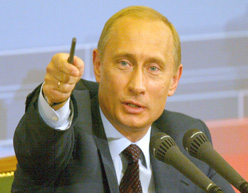Russian press’ Foreign Policy rating coverage faux-pas shows mediocrity at its worst
Source:
TRCW, FP & Experts' data

MOSCOW, Russia — The Russian press’ coverage of a purported Foreign Policy rating that allegedly ranked the nation’s omnipotent president, Vladimir Putin, as world’s “most influential leader” has shown the state-controlled media’s increasing mediocrity and its devastating repercussions at their worst.
Indeed, it has long become a common and worrying routine for the Russian press to simply report news and events as “prepared statements” that have to be taken as “axiomatic truths and unquestionable facts” and consequently require no verifications or second opinions to substantiate their authenticity.
It was, therefore, not unusual in Russia, when the nation’s top TV channels and other media outlets on January 2 picked up the Ian Bremmer’s blog ranking of global elites, where Putin was ranked the world’s second most powerful leader, and ran it as “breaking news” round-the-clock for two days before learning that they had been running “a spoof story.”
But in traditional or classical journalism, news editors should at least do two things before reduplicating an event of this nature on their airwaves or news pages. First off all, they ought to at least read the publication through to the last sentence to see the basis and the justification for placing each of the global leaders on their respective places in the ranking, and secondly, get a comment from the ranking’s authors and back it up with opinions sourced from both the pro- and anti-Kremlin camps for objectivity. However, none of these was done.
If these simple steps were taken, the Russian press would have avoided becoming the “laughing stock” that it has now become in the eyes of the global community. The local political observers, used by the press to get a bigger perspective on the rating, also failed woefully in their duties, as most of them, apart from being completely unaware of the Bremmer’s blog ranking publication, also saw the occasion as an opportunity to pledge their allegiance to the Kremlin in their praises.
However, they have only succeeded in proving themselves “as true Kremlin mouthpieces” ever ready to “heap praises” on the country’s leaders, rather than act as experts qualified to give an independent comment on issues of both national and global importance.
Unfortunately, the Russian press has been gradually declining in both the quality and substance of its publication and/or broadcasting since the Perestroika heydays, when local media freedom and professionalism were at their zenith. It, therefore, did not come as a surprise, when the country’s top media houses and their so-called scholarly experts got it completely wrong with the FP’s rating coverage.
These so-called experts only tried to outshine one another in their praises of Putin — who probably justifiably deserves such honors — instead of verifying the source of the rating, its authors and their methodological approach to ranking the Russian leader in the second spot. These experts have shot themselves point blank in their feet through their eagerness to praise the president and they will now have to find justifiable explanations for their myopic behaviors that led them to make such “childish errors of judgment” on such delicate issue of geopolitical importance.
The Russian press and the roaster of clowns that call themselves “international politics observers,” or “politologists” in the local lexicon, have only done a big disservice to Putin by helping to disseminate a ranking aimed at the author’s closed circle of readers to a larger global audience. The negative adjectives used to describe Putin as a leader have now reached a much larger audience than previously intended.
This coverage would have been a big shame to the whole of Russian journalism as it is today, if for not for some of the nation’s media houses — such as Echo of Moscow and RT — that are still trying to prove that professionalism journalism is still being practiced in the country. These two media were the only news agencies that either got the report on the Bremmer’s blog ranking publication right or at least noted that it was not an FP’s official rating.
How did these two agencies know about it? They probably did what the press is supposed to do as bonafide professional journalists, and not as agents of propaganda: verification of facts, data and other information before their publication. True journalists always do this, while agents of propaganda or so-called government mouthpieces or think tanks are not obliged to do so.
One can only hope that the Russian press, having shot itself on its foot in this affair, will now note this gargantuan difference between these two notions — professional journalism and propaganda or PR tools — for future use and strive to return back to its traditional calling and functions to the society for the benefit of all.
By Christopher Kenneth
The author’s opinion does not necessarily represent the opinion of the journal












 Web design,
Web design,